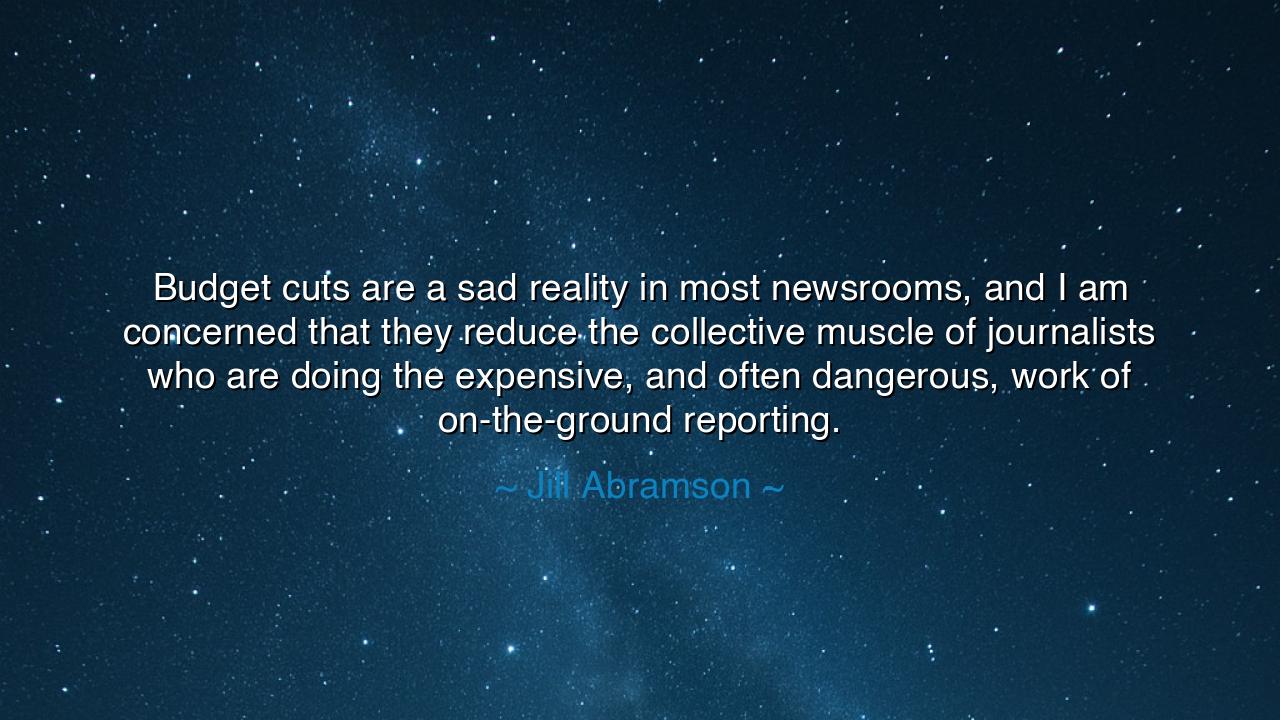
Budget cuts are a sad reality in most newsrooms, and I am
Budget cuts are a sad reality in most newsrooms, and I am concerned that they reduce the collective muscle of journalists who are doing the expensive, and often dangerous, work of on-the-ground reporting.






Jill Abramson once spoke with both sorrow and conviction when she said: “Budget cuts are a sad reality in most newsrooms, and I am concerned that they reduce the collective muscle of journalists who are doing the expensive, and often dangerous, work of on-the-ground reporting.” These words are not merely a lament for an industry in decline; they are a cry for truth itself, for the weakening of journalism is the weakening of democracy. Abramson, a veteran of news and principle, understands that when the hands that hold the pen grow weary, the world becomes more vulnerable to ignorance, deceit, and darkness. The collective muscle of journalists is not made of money or prestige, but of courage, persistence, and moral duty—and when that strength is diminished, civilization itself trembles.
In the ancient world, truth-tellers were revered as guardians of order. The Greek word aletheia—truth—meant “that which cannot be hidden.” The journalist, like the philosopher, is a seeker of this light. Yet, as Abramson laments, the torchbearers of truth now walk through storm and famine, their flames dimmed by budget cuts, their armor thinned by neglect. To reduce their resources is to starve the sentinels who keep watch on the gates of power. What use is freedom if no one remains to tell when it is being stolen? What good is speech if no one dares to speak from the field, where danger meets fact?
We can recall the story of Anna Politkovskaya, the Russian journalist who chronicled the brutality of the Chechen wars. Her work was not written from the safety of an office but from the perilous front lines, where bullets and lies flew alike. She paid for truth with her life. Yet her words endured, because they were written with that sacred courage Abramson calls “on-the-ground reporting.” Such heroes remind us that journalism is not a profession of comfort, but of sacrifice. When those who risk all for truth are abandoned by the institutions that should sustain them, the balance of the world shifts toward tyranny.
The sad reality Abramson names is not only economic but spiritual. When money is withdrawn from the pursuit of truth, it is not the journalists alone who are weakened—it is the conscience of the people. The cost of investigative reporting may be high, but the cost of ignorance is immeasurable. Empires have fallen, wars have erupted, and freedoms have withered not because the truth was too expensive, but because it was too neglected. To starve the newsrooms is to blind the public; to blind the public is to invite corruption to reign unseen.
Yet from sorrow, wisdom must rise. Abramson’s words are also a call to remembrance: that journalism is a sacred trust between the writer and the world. Those who read must not be passive consumers, but guardians of truth’s survival. Every citizen must understand that the muscle of journalism depends upon their support—through attention, empathy, and respect for fact. To scorn the press or mock its struggle is to mock one’s own need for knowledge. In the ancient forums, citizens debated freely because they were informed; without the informers, the forum collapses into noise.
Therefore, let this teaching be passed down: the work of on-the-ground reporting is not the luxury of a free society—it is its lifeblood. Just as soldiers defend the borders, journalists defend the soul. The ancients spoke of the “watchmen on the walls,” those who stayed awake while others slept, sounding the alarm when danger approached. So too are the reporters of our age: unseen, often unpraised, yet essential to our safety and our conscience. When their numbers dwindle, the night grows longer.
The lesson, then, is clear and timeless: never take truth for granted. Honor those who seek it, and sustain the institutions that make it possible. If the day comes when no one stands in the dust, the smoke, the courthouse, or the war zone to bear witness, then history will be written not by the brave, but by the powerful. And so we must act—read deeply, think critically, support courage where it lives. For if the pen falters, the sword will rule. And when the bright flame of journalism flickers, each of us must become a keeper of its fire, that truth may yet endure through every storm that seeks to silence it.






AAdministratorAdministrator
Welcome, honored guests. Please leave a comment, we will respond soon